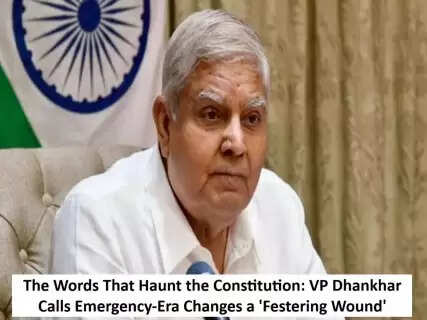
In a powerful address that delves deep into one of modern India's most controversial chapters, Vice President Jagdeep Dhankhar has reignited a critical debate about the very soul of the Indian Constitution—its Preamble. He described the changes made during the dark days of the Emergency as a "festering wound" and a "fraud" on the nation's founding document.At the heart of his critique are two words—"socialist" and "secular"—that were inserted into the Preamble through the 42nd Amendment in 1976. Dhankhar’s argument is not just about the words themselves, but about the moment they were added. This was a time when democracy was suspended, fundamental rights were curtailed, and many opposition leaders were imprisoned.He didn't mince words, labeling the amendment a "fraud on the Constitution." He drew a sharp contrast between the original Preamble, born from nearly three years of intense and open debate by the nation's founders in the Constituent Assembly, and the 1976 amendment, which he argues was pushed through without any meaningful discussion or democratic consent."How can you amend the Preamble? It is the soul of the Constitution," Dhankhar questioned, emphasizing that the original document, crafted by luminaries like Dr. B.R. Ambedkar, already embodied the principles of social, economic, and political justice without needing explicit labels. He asserted that imposing these terms during the Emergency was an act that compromised the very integrity of the constitutional process.Dhankhar’s remarks, delivered at an event marking the 50th anniversary of the Emergency's declaration on June 25, 1975, serve as a stark reminder of that period's impact on India's democratic fabric. By calling it a "festering wound," he suggests that this historical act continues to have implications today.This isn't just a debate about semantics; it's a fundamental question about the nation's identity, the sanctity of its founding document, and whether a text forged in a moment of authoritarianism can truly represent the democratic spirit of India.
Around the web

